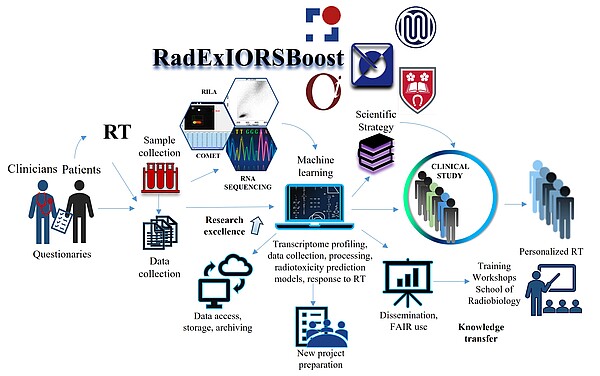Objective
Prostate cancer patients receiving radiotherapy (RT) may develop radiation-induced side effects, which significantly impact quality of life. One of the main challenges in radiobiology is to predict individual patient's normal tissue radiosensitivity to tailor personalized RT. Although the Institute for Oncology and Radiology of Serbia (IORS) is a highly specialized health, scientific, and educational institution it is necessary to develop a strategic action plan and sustainable knowledge transfer networking with top-class leading European institutions.
Through the six Specific Objectives, RadExIORSBoost project aims to develop and implement institutional Scientific Strategy on radiobiology, to investigate individual radiosensitivity by transcriptome profiling, radiation-induced lymphocyte apoptosis, and measurement of DNA damage levels, to design a high-quality clinical study, and to raise the research capacity of IORS and partner institutions through international workshops, short-term visits, and trainings.
RadExIORSBoost project aims to strengthen the administrative and research management skills of IORS. RadExIORSBoost project realization will increase the scientific excellence of IORS to approach high-ranking partner institutions, Medical Faculty Mannheim, Heidelberg University (UHEI), Germany, the University of Leicester (ULEIC), United Kingdom, Medical University of Vienna, Center for Cancer Research, (MUW) Austria, and the Institute of Oncology Ljubljana (IOL) from Slovenia. Artificial intelligence-based models, such as machine learning may give directions towards the clinical application of peripheral blood mononuclear cell transcriptome, and list potential biomarkers predicting radiotoxicity, not only in cancer patients, but also in healthy individuals at risk.
RadExIORSBoost project may blaze the trail for technological innovations in modern radiation oncology to significantly reduce the side effects of RT and its harmful effects on the environment.
RadExIORSBoost project will represent a significant step towards the individualisation of radiotherapy
Through the project objectives, RadExIORSBoost project aims to develop and implement institutional Scientific Strategy on radiobiology, to investigate individual radiosensitivity by transcriptome profiling, radiation-induced lymphocyte apoptosis, and measurement of DNA damage levels, to design a high-quality clinical study, and to raise the research capacity of IORS and partner institutions through international workshops, short-term visits, and trainings.
Artificial intelligence-based models, such as machine learning may give directions towards the clinical application of peripheral blood mononuclear cell transcriptome, and list potential biomarkers predicting radiotoxicity, not only in cancer patients, but also in healthy individuals at risk. RadExIORSBoost project may blaze the trail for technological innovations in modern radiation oncology to significantly reduce the side effects of RT and its harmful effects on the environment.
The proposed project will represent a significant step towards the individualisation of radiotherapy, which is a primary goal for scientists and radiotherapists in the coming years in Europe. Implementation of this project will represent a new concept and approach in the field of radiobiology. The RadExIORSBoost will develop a powerful group of researchers, radiobiologists and radiotherapists, and enable future development of radiobiology research, who complement with each other in regard to their expertise. This will make a significant contribution to the advancement of cancer research at a national and European level. The realisation of this project will potentiate future research by the development of a European collaborative research and clinical network.

Figure: The RadExIORSBoost project aims to advance the prediction of individual radiosensitivity in prostate cancer patients.
"Our Institute of Oncology Ljubljana, as a Comprehensive Cancer Centre, is committed to advancing the field of radiobiology. Our research is informed by the experiences of our staff gained at renowned international institutions such as M.D. Anderson Cancer Institute, Gray Laboratory, and CRUK/MRC Oxford Institute for Radiation Oncology. Part of our work focuses on the radiosensitising effects of electrochemotherapy or gene electrotransfer using plasmids coding for immunomodulatory or anti-angiogenic molecules. We are conducting several new research projects in radiobiology using in vitro and in vivo models. " said prof.dr. Maja Čemažar, project leader at the Institute of Oncology Ljubljana.
"The IOL team will leverage our existing resources and equipment to contribute to the dissemination and implementation of the latest techniques and methods in radiobiology. Through the RadExIORSBoost project, we aim to discover novel biomarkers of radiotoxicity at a global level, opening new directions to improve RT success and enhance the quality of life for patients. This project represents a advancement towards individualized radiotherapy, and we are proud to be a part of it." concluded prof.dr. Maja Čemažar.
Project information
Project title: RadExIORSBoost - Twinning to skyrocket scientific excellence towards individual radiosensitivity prediction by raising the bar in knowledge transfer, networking, and technological innovation in radiobiology
Project duration: 36 months (October 2024-September 2027)
Partners: Institute for Oncology and Radiology of Serbia (coordinator), partners Institute of Oncology Ljubljana (Slovenia), the Medical Faculty Mannheim, Heidelberg University (Germany), University of Leicester (UK), Medical University of Vienna's Center for Cancer Research.
Budget: 1.499.860 €
Contact
Institute of Oncology Ljubljana
Prof.dr. Maja Čemažar, project leader and head of Research and Education
email: mcemazar@onko-i.si
“Funded by the European Union. Views and opinions expressed are however those of the author(s) only and do not necessarily reflect those of the European Union or European Research Executive Agency (REA). Neither the European Union nor the granting authority can be held responsible for them.”

